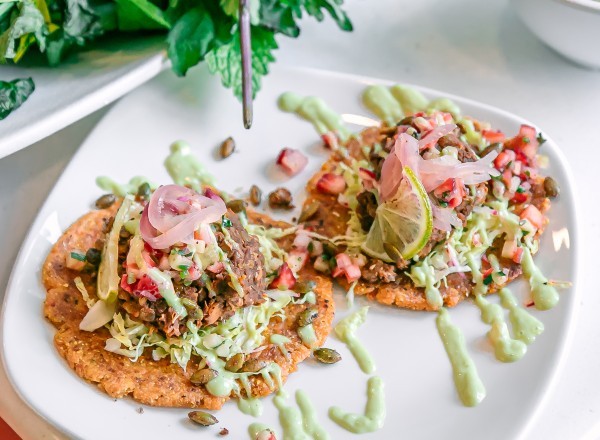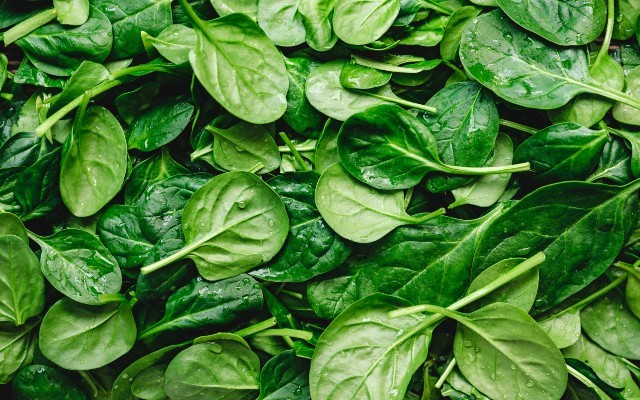Media
Contact Us
- Home
- Who We Are >
- What We Do >
- Investors >
- Sustainability >
- Media
- Working for Us >
- Contact Us

Our food choices can have a big impact on the planet. In line with the EAT-Lancet’s recommendations about a planet-friendly diet, we are helping to rebalance menus celebrating fruits, vegetables and other plants in our plant-forward offerings.
Adopting a plant-forward diet, where plant-based products are the principal ingredients, is one of the simplest steps an individual can take to lower their personal carbon footprint. Consumer demand for plant-based meals is on the rise and we continue to expand our offer of healthy, plant-based menu items. We are also engaging, educating and exciting consumers to make positive choices, as well as nudging behavioural change through choice design techniques.
Our strategy is guided globally but implemented according to local consumer preferences and value chain approaches.
Case Studies
New Vegetarian Restaurant Concept - Finland
Compass Group Finland introduced Tempo Goes Green - a new vegetarian restaurant that responds to the changing eating habits and values of students and young people. The restaurant's philosophy is based on the idea that vegetarian food is good for both health and the environment. The restaurant uses as many fresh and seasonal ingredients as possible. The restaurant also works to reduce food waste and recycle waste efficiently.
Guests can enjoy a varied vegetarian menu including colourful salads, tasty spreads and vegan options. The restaurant serves a daily changing lunch buffet with a variety of vegetarian dishes, making vegetarian food easy, attractive and delicious. The restaurant invites everyone to explore what it has to offer and discover new taste sensations; with the belief that vegetarian food is the food of the future, suitable for everyone.


Bon Appetit Wins Innovative Dining Award – USA
In the US, our Bon Appetit chefs focus on highlighting creative plant-centric meals and menus, bringing plants to the centre of the plate. A leading industry magazine learned about Bon Appetit’s efforts to push plant-forward boundaries at the Culinary Institute of America’s 2023 Global Plant-Forward Culinary Summit, and honoured them as the inaugural winner in the foodservice category.
Dishes like plant-forward ‘crab’ cakes with pickled onions, Philly cheesesteaks that swap beef for seitan but keep the melted cheese, and blended beet and bean burgers have been enticing guests from Bon Appetit accounts across the US.
Meat Monday Club - Sweden
The ‘Meat Monday Club’ is a new proposition where Compass Group Sweden’s guests can join and become a Meat Monday Member. The restaurant only offers meat on Mondays – beef, pork, lamb, reindeer and game. The rest of the week we serve vegetarian, vegan, fish and poultry.
To become a club member, individuals must participate at least one week per month. Outside of this, it is down to them to determine the frequency at which they choose menu options containing meat products.
A dish with minced beef, for example, is responsible for circa four times as much carbon compared to a typical vegetarian dish. We are also making major changes to our menus based on Compass Group Sweden’s overall goal, which is a maximum of 0.5 kg CO2e on average per centrally planned meal by 2025. At present, we are seeing 0.7 on average.

Case Study Archive
'Planet Promise Day' - Norway
Compass Group Norway celebrated its very own ‘Planet Promise Day’ across its sites earlier this year. Hosted on World Pulses Day, it was our opportunity to promote the benefits of rebalancing menus whilst highlighting plant-based foods.
Our chefs were challenged to prepare innovative and delicious tacos using pulses – like beans, chickpeas, lentils and peas. The advantages of using pulses are far-reaching, including using less water than other crops, increasing the output of other plants when utilised in crop rotation, and promoting soil carbon absorption, to mention a few!
Celebrating World Pulses Day - Italy
Compass Group Italy hosted several events in support of the globally recognised World Pulses Day. Working in partnership with our supplier, Planted - a Swiss food tech start-up known for its natural bio structured meat made from alternative proteins - our teams served over 140 plant-based meals. Meals such as Planted chicken, kebabs and schnitzel save up to 87% kg CO2e on average compared to regular meat. They also have a reduced freshwater footprint of circa 90%.
As part of the event, a competition was held with almost 100 of our chefs to create the greatest vegetarian recipe. The winner, broccolette, or ‘broccoli veggie balls’, is now a mainstay on our menus as we nudge guests towards a more sustainable and healthy diet.
The Shift Academy - Australia
In Australia, we launched the Shift Academy, a training programme aimed at educating our chefs on why plant-forward menus are important, and at the same time empowering them to innovate and create their own dishes with skills like agro-diverse sourcing to menu presentation.
The academy delivers cross-sector training through face to face and virtual workshops and has encouraged engagement through plant-forward campaigns and meal design competitions. So far, we have trained over 50 chefs though workshops spanning three states, building our front-line capability towards plant-forward. There are plans to scale the programme throughout 2023 to the rest of the Asia-Pacific region.
Green Deal Protein-rich Crops - Netherlands
As part of the National Protein plan to increase protein self-sufficiency in the Netherlands, Compass Group Netherlands signed the Bean Deal (National Green Deal Protein-rich Crops) along with 55 other Dutch organisations.
The coalition aims to promote the production, processing, and consumption of Dutch protein-rich crops to make cultivation financially viable and promote the sustainability of agriculture in the Netherlands.
The focus on leguminous crops encourages the benefits of ideal crop-rotation cultivation, low water consumption crops and carbon intensive agriculture.
Inspiring kids to choose plant-based - USA
A chef-led commitment from our Chartwells K12 team in Rhode Island, which serves 23 school districts in the state, has encouraged kids to choose new and exciting plant-based foods. A committed team of chefs, cooks, and food service colleagues participated in multi-day training and culinary events to create recipes that emphasise plants and employ seasonal and local ingredients.
Hungry for more?
© 2026 Compass Group PLC



